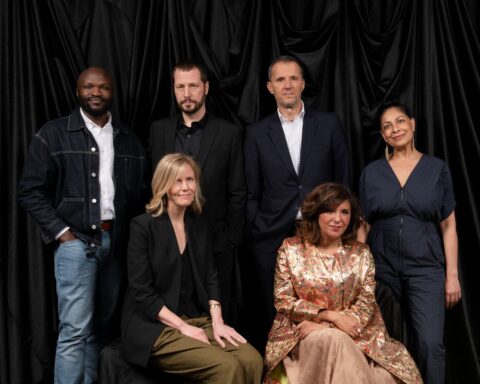Long before beginning her first feature documentary, Alias, Michelle Latimer applied to medical school. The jump from doctor-to-be to documentarian might seem counterintuitive but for the Toronto-based actor, programmer and director, the transition was based in both professions’ ability to heal. A lofty ambition—and Latimer is the first to admit this—but having grown up Métis in Northern Ontario, injustice was never an abstract notion. She understands the power of a positive artistic voice to empower, even heal, a community.
After working in front of the camera for years, Latimer was beginning to feel unfulfilled, as “acting wasn’t contributing on a larger social level.” Enter medical school, but in what she calls a “serendipitous” turn of events, Latimer ended up taking a documentary course while waiting to hear back from various universities. Learning to create a film from the footage she got while volunteering in a Kenyan HIV clinic, she eventually connected with other filmmakers interested in the HIV/AIDS crisis and worked on Triage: Dr. James Orbinski’s Humanitarian Dilemma (2008). The world of white coats wasn’t meant to be.
Shortly after Triage, Latimer made the short Choke (2010), which followed a young man leaving his reserve for the city, and received a Genie nomination for Best Animated Short. Currently working on a new short at the National Screen Institute in Winnipeg, Latimer is adapting the Canadian novel Cockroach by Rawi Hage. In production when we spoke, she reflected on how her films tend to focus on outsiders, something she accredits to her own background. Though she’s quick to note she doesn’t believe in a universally shared experience, for Latimer her heritage allows her to “be objective in a different way.”
This came to bear working on Alias, which is set in Toronto’s underground rap scene. Following artists and promoters, Latimer worked on the project for two years, getting to know her subjects, gaining trust and access into the subculture, then shooting in 14 days. Never intending the project to be a process documentary, she sought “not [to] present answers, but a tableau of a life.” Contrasting moments of vérité realism with slow-motion sequences that verge on the surreal and beautiful, Alias not only offers an insider look at a different urban space, but also seeks to place the viewer in the euphoric state of her subjects: their “perfect world as a performer.” During a rap concert, the diegetic noise is dialed down, replaced with an ambient tune as the images slow, turning the venue into a serene place of escape. As Latimer says, these moments are meant to capture “the safe place you go when you allow yourself to dream.” Something that’s a luxury for many featured in the film.
Self-described as “not a huge rap fan,” Latimer came to the story through an article in The Toronto Star on Alias Donmillion, the rapper who would become the film’s namesake. Written about in the paper as a typical story of black urban youth—guns, drugs and violence—Latimer was drawn to unearth the story behind the stereotypes. “I’m interested in the private person versus public,” she says. “The person we want to be versus who we are, the performer versus the non-performer.” Rap, a genre which has transcended into a lifestyle, was the perfect place to do this.
Opening with closed-circuit footage of young black men committing various acts of crime, Alias quickly subverts these familiar images from the nightly news by countering them with profoundly personal profiles. But as Latimer points out, these men and women are not only bound by what society projects onto them, but what hip-hop has come to represent: “Rap comes from roots of revolution, but it’s been subverted and monetized[…] Something that was meant to break stereotypes is now imprisoning people within it.” Exploring this double bind lies at the heart of her film.
Latimer isn’t naive and realizes how Alias might be perceived: “I really don’t want the film to be seen as an outsider coming into a black culture.” Yet coming at it as an outsider herself granted her respect from her subjects, who opened up when they discovered she was Native. (“It was just assumed I understood what they were talking about,” she says. “And often I did.”) Having spent most of her life “climbing over stereotypes,” she didn’t see it as a stretch to be making this film. It’s an application of her Métis experience connecting to another culture—bridging the two might begin to create some healing.
Click here for POV’s full list of Hot Docs previews.
Screenings:
Fri, Apr 26 7:00 PM
The Royal Cinema
Sun, Apr 28 1:00 PM
Scotiabank 3
Sat, May 4 8:45 PM
Scotiabank 4










